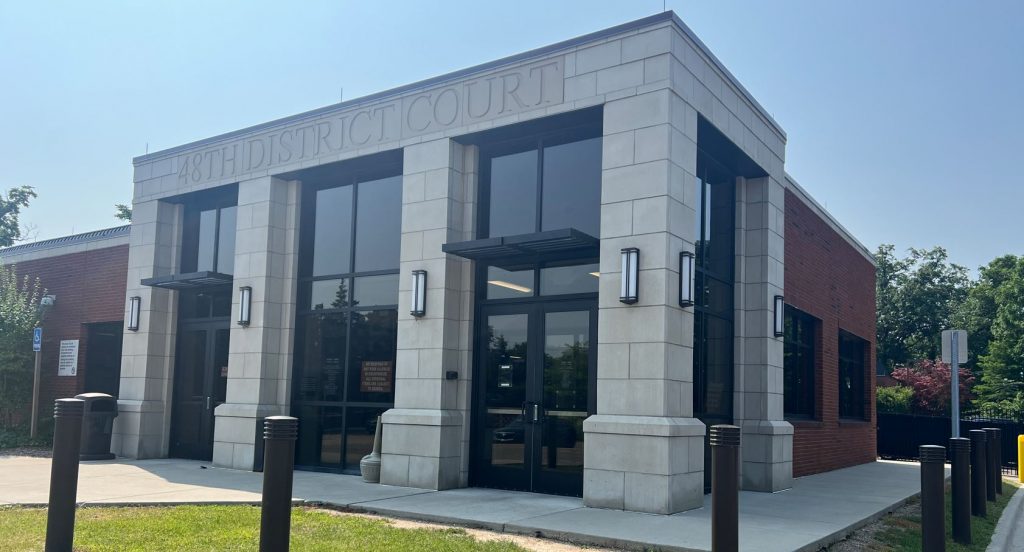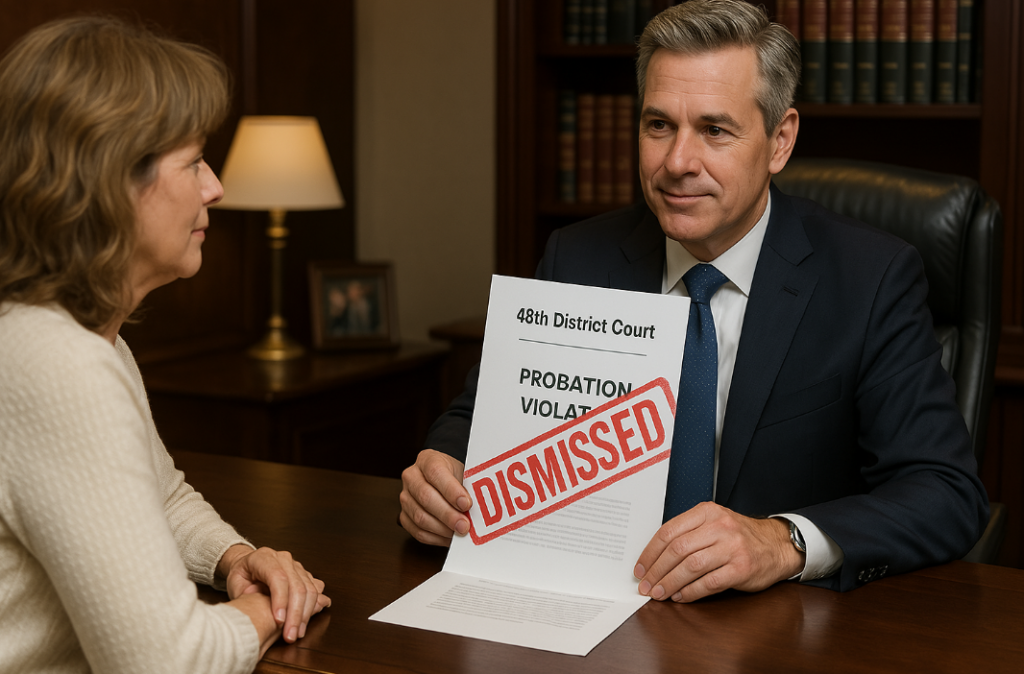48th District Court Probation Violation Attorney
If you face a probation violation in the 48th District Court, you probably already know you need the strongest possible defense. We can help you.

Probation Violation Defense in the Bloomfield Hills District Court
Judges in the 48th District Court routinely order probation at sentencing for defendants convicted of misdemeanor offenses. Probation is a period of court supervision wherein the defendant must comply with various terms and conditions set by the judge at the sentencing hearing. Under Michigan law, probation is a “matter of grace,” not a right. In the Bloomfield Hills District Court, probation can be so onerous and complex that it feels nothing like “grace” and more like an impossible burden. A defendant needs a reputable, influential defense attorney for a 48th District Court probation violation.
According to the law, all probation orders are revokable. Under relatively new amendments to the law, a judge should only impose jail for repeated technical violations, new criminal behavior, or upon request of the probationer/defendant.
Technical Violations of Probation
Any violation of the Order of Probation is a technical violation other than the following:
- new criminal activity (whether or not there is a new charge),
- violation of a no-contact order,
- consuming alcohol while on felony OWI probation, and
- absconding probation.
A probationer who commits a technical violation of probation on a misdemeanor case is subject to the following penalties:
- 1st violation – 5 days in jail
- 2nd violation – 10 days in jail
- 3rd violation – 15 days in jail
- 4th or subsequent violation – up to the balance of the full jail sentence available on the original charge.

How to Avoid Jail for a Probation Violation in the 48th District Court
The best defense to a probation violation allegation in the 48th District Court is a strong offense! There is no room for errors or lack of effort when defending a VOP in Bloomfield Hills. The Defense Team with LEWIS & DICKSTEIN, P.L.L.C. defends probation violations in several ways, including attacking the facts, advocating the law, and building an equitable defense. If the facts do not support the violation, we can attack the credibility of the government’s evidence, obtain and admit favorable evidence, and take measures to disprove untruthful allegations. Suppose the law does not support the violation or punishment under consideration. In that case, we can credibly and powerfully argue why the law supports dismissing the allegation or a lenient sentence.
If there is no defense to the probation violation allegation, we can argue that equitable considerations mitigate against a finding of guilt or the imposition of punishment. Sometimes, the 48th District Court’s judges will consider equitable factors, such as family hardship, medical condition, immaturity, and risk to employment, to name but a few. It is a defense attorney’s job to raise every equitable consideration possible in the hope that at least one may resonate with the judge and secure leniency. Unfortunately, not all defense attorneys take the time and effort to put forth a compelling argument.
New amendments to the Michigan Court Rules provide another option for avoiding jail and other sanctions. For example, a Court might permit a probationer to file a written acknowledgment of a technical probation violation before a scheduled hearing. The judge cannot impose jail or revoke probation if the acknowledgment is sufficient under the applicable law. The judge or probation officer must permit the acknowledgment. An acknowledged violation counts when identifying the number of technical probation violations.
Revocation of Probation
After three or more technical violations or a nontechnical violation, such as new criminal activity, the judge can revoke probation. If the 48th District Court judge revokes probation, they can order the defendant to serve the balance of any remaining available jail, order fines/costs, or discontinue supervision.

Multiple Violations
If a probation violation includes multiple counts or separate allegations, the judge must determine if they count as technical violations. If several violations occur as part of one transaction, they constitute a single technical violation. If any of the allegations are nontechnical, then they are considered separate. For example, suppose someone tests positive for alcohol and unplugs their testing device to hide the violation. In that case, those two technical violations are part of the same transaction and count as one technical violation. If someone is on probation for a misdemeanor OWI and commits a new drunk driving offense, they will face two violations: (1) consuming alcohol (a technical violation) and (2) committing a new crime (a nontechnical violation).
Don’t forget that just because someone violates probation doesn’t mean they must go to jail or lose a deferral status. With good, effective legal representation, an attorney might be able to persuade the judge to give the client another chance and prevent a jail sentence in the Oakland County Jail or the loss of a deferral status, such as HYTA (youthful offenders), 769.4a (domestic violence), or 7411 (drug cases).
Common Nontechnical Violations
The three most common nontechnical violations in the Bloomfield Hills District Court are:
- absconding,
- violating a no-contact order, and
- new criminal activity.
Absconding Probation in the 48th District Court
Someone is an absconder if they fail to appear for a probation meeting or abandon compliance with probation. A defendant who abandons probation is subject to probation revocation. The judge can sentence them to the maximum possible sentence for the initially charged offense; however, jail is not mandatory for a probation violation.
Violation of a No-Contact Order
A common term of probation, especially for assault cases (such as domestic violence), is a no-contact order. In the 48th District Court in Bloomfield Hills, “no contact” means no direct or indirect contact. Direct contact includes talking, emailing, messaging, gifting, calling, or directly contacting or interfering with the victim. Indirect or third-party contact means using another person or means of contacting the victim, such as passing messages through a family member or friend.
New Criminal Activity
Violating a state or federal criminal law or a misdemeanor municipal ordinance is a nontechnical violation that can result in imprisonment or revocation of probation. The judge can order a maximum sentence and revoke probation regardless of the severity of new criminal activity or whether it resulted in new charges. The most common new criminal charges in the 48th District Court include OWI, domestic violence, and retail fraud.

Your Best Defense to Probation Violations in the 48th District Court
You need a lawyer who will do whatever it takes to fight for a dismissal of the violation and/or a lenient sentence without incarceration if you face a misdemeanor probation violation in Bloomfield Hills. The Defense Team with LEWIS & DICKSTEIN, P.L.L.C. uses a unique team approach that consistently and reliably achieves extraordinary results. We have an unparalleled track record of success in getting our clients out of unjust probation violations and avoiding jail sentences. Call us for a free consultation. We will take the time to talk with you, answer your questions, and work with you to develop a winning strategy!
Call us today at (248) 263-6800 for a free consultation or complete an online Request for Assistance Form. We will contact you promptly and find a way to help you.









